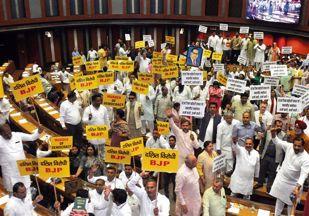
Not simple: Despite opposition, President Trump has a significant base among conservative voters and the rural heartland.
Neera Chandhoke
Political scientist
Substantial parts of our world have been captured by right-wing populists, and interestingly, all such leaders have a great deal in common. One, they contemptuously dismiss institutions as embodiments of privilege; a nuisance at best and irrelevant at worst. Two, populists forge a national constituency unmediated by institutions, organisations or the opposition. Three, they represent themselves as targets of conspiracies fashioned by an elite that has become corrupt, moribund and irrelevant. Four, populist leaders refuse to play by rules of the game. Whether it is Trump, or Modi, they have no hesitation in uttering statements that their predecessors would deem improper. They are simply unpredictable.
President Trump is the quintessential populist leader, he disdains political proprieties. His presidency has been ridden by controversy since day one, random dismissal of important officials, wilful decisions, and open distribution of benefits to his own family. Ever since the Democrats took over the House of Representatives in January 2019, the Congress has been pulverised. The Republican-controlled Senate has blocked every piece of progressive legislation passed by the House. It is not, therefore, surprising that in September the Speaker of the House of Representatives, Nancy Pelosi, announced that an impeachment inquiry would be initiated against the President. He had reportedly requested his counterpart in the Ukraine to ‘dig up dirt’ on Joe Biden, a possible Democrat contender for the 2020 presidential elections. Does asking a foreign power to intervene in elections warrant impeachment?
Historians suggest that members of the Constitutional Convention that met in Philadelphia in 1787 to draw up the American constitution were unhappy with the authority vested in the President. In accordance with doctrines of checks and balances, the Congress was given the power to impeach the President in cases of ‘treason, bribery or other high crimes and misdemeanors’. This provision, which was in keeping with the spirit of British constitutional and legal practice, is not meant to punish the incumbent of the White House; merely to remove him from office. The process is cumbersome. The House of Representatives has to pass Articles of Impeachment, or a list of charges, by a majority vote. The case then goes to the Senate, which is convened as a judiciary to hear arguments from both sides. The removal of the President requires a two-thirds majority.
It was feared, as one of the founders of the American constitution accepted in a piece in Federalist No. 65, that impeachment will ignite political passions, harness animosities, partialities and influence, and divide the country. The process might prove more harmful than any decision on innocence or guilt. Alexander Hamilton was prescient. Impeachment proceedings have been launched against two Presidents — Andrew Johnson in 1868 and Bill Clinton in 1998. The former took over the presidency after the assassination of President Abraham Lincoln during the civil war in 1868. He is considered a racist because he openly supported the cause of White Southerners, and opposed the civil rights of liberated Afro-Americans. He was impeached on a technical issue; that of vetoing a law passed by the Congress. In the Senate, his impeachment was defeated by one vote.
Impeachment proceedings were initiated against Clinton following allegations that he had lied to the Special Prosecutor about his sexual relationship with a White House intern. He was under oath. The move failed because it could not secure a two-thirds majority in the Senate. Clinton’s case is controversial; experts argue that a President cannot be impeached for personal wrongdoing that may not reflect on public affairs.
The only President against whom impeachment proceedings would have been successful is Richard Nixon. He, however, resigned within two years of his second term. In July 1974, 28 out of 38 members of the House of Representatives judiciary committee voted to impeach him. Members of his own party affirmed that they would vote against him. On August 5, the proverbial ‘smoking gun’ established that he had covered the break into the headquarters of the Democratic Party at Watergate by his campaign committee during the 1972 presidential polls. Nixon was aware that the Senate would vote for his dismissal. He resigned. If impeachment had succeeded, it would have established the superiority of the Congress over the executive.
Today, Democrats have left no stone unturned to impeach the President for serious abuse of power. Trump tweets conspiracy theories and appeals to his constituency. He also threatens to find the whistleblower. These two extremely irresponsible statements can possibly add to the list of offences charted out in the Articles of Impeachment.
Hamilton’s foreboding that impeachment would divide popular opinion and split the country, rather than successfully remove the President from power, has come true. Ever faithful to their vocation, survey agencies have rushed to the American people for their opinion, the President’s men rush to television studios to plead that their boss is being victimised, the President tweets that this is a conspiracy, and Democrats claim that a robust case exists for impeaching Trump.
Even if the House of Representatives votes for impeachment, it is debatable whether the move will pass the Senate, which, controlled by the Republicans, backs the President, at least to date. More significantly, Trump has a significant base among conservative voters and the rural heartland. On October 1, he tweeted an electoral map dominated by his colour, red — ‘Try and impeach this’, he challenged. Perceive the irony. The populist leader scorns institutions and addresses the ‘people’. Therefore, he can present himself as a casualty of intrigues, even though he is the most powerful man on earth. Nothing works like sentimental narratives of victimhood. Trump might emerge as a martyr; as a hostage of entrenched power, not quite smelling of roses, but still.



























